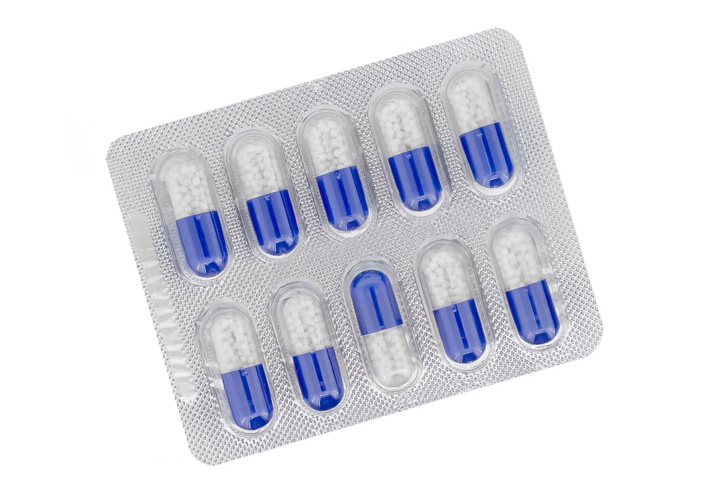Cefaclor
Cefaclor is a cephalosporin antibiotic, active in bacterial infections. Drug is used in the treatment of the following conditions, if the pathogens are sensitive to the active ingredient: pulmonary, bronchial and pharyngeal infections, tonsillitis, sinusitis, otitis media, skin and soft tissue infections and cystitis.
What Does Cefaclor Contain?

1 film-coated tablet contains: 375, 500 or 750 mg cefaclor in the form of cefaclor monohydrate, E132 (indigotine) colouring and adjuvants.
Forms and Strengths
Uses
Follow exactly the daily dosage and duration of treatment prescribed by your doctor. Continue treatment with antibiotics, once started, for the duration indicated by the doctor. The symptoms of the disease often disappear before the infection is completely healed. If treatment is not continued long enough or stopped too soon, the disease may flare up again.
Unless your doctor advises otherwise, the following doses are generally used:
Adults and children over 12 years of age
The usual dosage is 375 to 750 mg 2 times a day.
Pharyngitis, tonsillitis, skin infections: 375 mg 2 times a day.
Cystitis: 375 mg twice a day or 500 mg in the evening.
Mild to moderately severe pneumonia: 750 mg twice a day.
Sinusitis: 750 mg twice daily (treatment lasting 10 days).
Do not exceed a daily dose of 4 g.
Children under 12
Cefaclor film-coated tablets are not suitable for the treatment of children under 12 years of age.
Swallow the film-coated tablets without chewing during meals.
For patients with severe renal impairment, a reduction in dose may be prescribed by the doctor.
Do not change the prescribed dosage yourself.
Side Effects
Taking Cefaclor may cause the following side effects:
Common side effects
Allergic skin reactions such as redness, itching, itchy papules (urticaria), rash; stomach heaviness, nausea, vomiting, loss of appetite, bloating, loose stools or diarrhoea.
If severe persistent diarrhoea occurs during or after treatment, contact your doctor immediately.
Occasional side effects
Temporary hyperactivity, nervousness, insomnia or drowsiness, confusion, dizziness and hallucinations.
Severe skin symptoms with general life-threatening reactions, changes in the blood count (diagnosed by the doctor), oedema, drug fever, vaginitis (inflammation of the vagina), reactions resembling serum sickness such as skin rashes with joint problems and often fever, severe acute hypersensitivity such as facial oedema, swelling of the tongue, swelling of the inner larynx with constriction of the airways, flushing of the heart, shortness of breath (respiratory distress), fall in blood pressure to the point of life-threatening shock.
If you experience an allergic reaction to Cefaclor, tell your doctor immediately. He or she will then decide to discontinue treatment with this antibiotic and, subsequently, to continue treatment with appropriate medication.
Transient hypertension, renal inflammation.
Rare and very rare side effects
Chest pain has been observed very rarely, which may be a sign of a potentially serious allergic reaction called Kounis syndrome.
Blood changes such as anaemia, blood count changes (e.g. neutropenia, thrombocytopenia, leucopenia), which may be detected by the doctor. Temporary inflammation of the liver and jaundice, excretion of proteins in the urine.
Strong and persistent diarrhoea.
Serious skin reactions have been reported.
If you notice any side effects not mentioned in this leaflet, please tell your doctor or pharmacist.
Precautions
This medicine may cause dizziness, affecting your ability to react, drive and use tools or machines.
If you suffer from allergies to other medicines, asthma, hay fever or hives, talk to your doctor before treatment. If you experience breathing difficulties, chest tightness, swelling of the eyelids, face or lips, or skin rashes during treatment, tell your doctor or pharmacist immediately before continuing treatment with Cefaclor.
If you experience severe diarrhoea, you should inform your doctor immediately. Medications for the treatment of diarrhoea that inhibit intestinal peristalsis (intestinal movement) must not be used.
In the event of inflammatory symptoms of the liver or jaundice, such as fatigue, weakness, malaise, loss of appetite, nausea, vomiting, yellowing of the eyes (conjunctiva), discoloured skin or stools, inform your doctor immediately before continuing treatment with Cefaclor.
Some medicines may affect the effects of Cefaclor. In particular, other antibiotics may increase or reduce the effects of this drug.
If you are taking an oral contraceptive ("pill"), its effectiveness may be reduced by Cefaclor. Additional contraceptive measures should therefore be taken.
Medicine should be used with caution in patients with impaired renal function.
As with other betalactam antibiotics, probenecid (a gout treatment) inhibits the elimination of Cefaclor by the kidneys.
If you are taking medicines containing the active ingredient probenecid (for the treatment of gout), medicines that reduce stomach acidity (for example, antacids containing magnesium and aluminium hydroxide), other antibiotics (in particular antibiotics from the so-called aminoglycoside group or active substances such as colistin, polymixin B, vancomycin or chloramphenicol), or oral contraceptives, please inform your doctor or pharmacist.
Cases of particularly serious, potentially fatal, skin reactions have been reported after taking Cefaclor. The signs of such skin reactions are:
- Flu-like symptoms and fever
- Itching of the skin
- Mucosal reactions (such as swelling of the lining of the mouth or throat, blistering, bleeding)
- Swelling of the face or other parts of the body
- Chest pain (Kounis syndrome).
If you experience these symptoms after taking Cefaclor, you should stop treatment and contact a doctor immediately.
What else do you need to consider?
This medicine has been prescribed by your doctor for the treatment of your current illness.
The antibiotic contained in Cefaclor is not active against all the germs that cause infectious diseases. Using the wrong antibiotic or the wrong dose can cause complications. Never use an antibiotic of your own accord to treat another illness, and do not pass the medicine on to other people.
Prolonged use of Cefaclor may cause pathogens that are not sensitive to the drug to proliferate excessively. In the event of superinfection during treatment, your doctor will take appropriate measures.
Diabetics
In diabetics, the determination of sugar in the urine may give a false positive result if assay methods based on copper reduction are used (e.g. Fehling, Benedict, Clintest).
In this case, enzymatic tests should be applied.
When should Cefaclor not be used?
Drug must not be used in cases of known or suspected hypersensitivity to cephalosporin antibiotics, penicillins, certain other antibiotics or other components of Cefaclor. Hypersensitivity is manifested, for example, by asthma, respiratory distress, circulatory disorders, swelling of the skin (e.g. urticaria) and mucous membranes or skin rashes.
Pregnancy and Breastfeeding
If you are pregnant, trying to conceive, or breastfeeding, it is important to inform your doctor or pharmacist. They will determine whether it is safe for you to use the medication during pregnancy or while breastfeeding.
What is Sinusitis?
Sinusitis is a benign but common ENT disease. It affects around 15% of the population every year. It is an inflammation of the mucous membrane of the sinuses, causing congestion of the nasal passages. There are several types, depending on the precise location of the condition and its cause. In its infectious form, it may be associated with a cold. In other cases, the inflammation of the sinuses is allergic.
Medical advice will provide the right course of action to relieve the nasal problems caused by acute sinusitis and prevent it from becoming chronic. Antibiotic treatment is generally not necessary.



